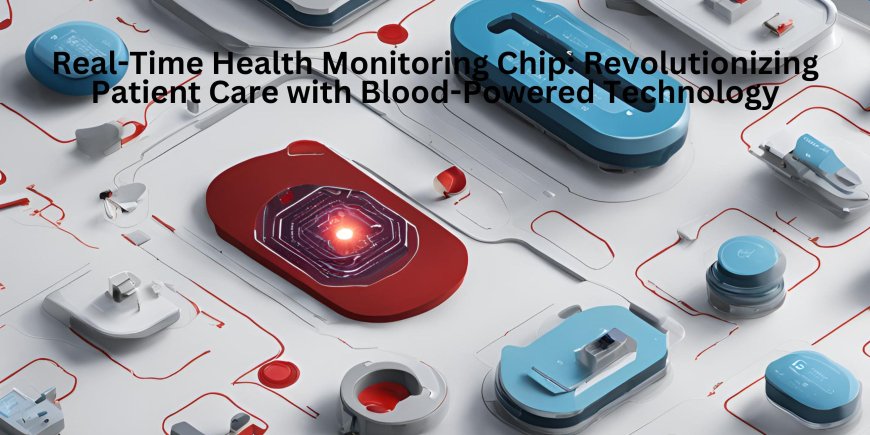Real-Time Health Monitoring Chip: Revolutionizing Patient Care with Blood-Powered Technology
An innovative chip powered by blood can provide real-time health monitoring, offering a transformative approach to managing health conditions and improving patient outcomes. Explore how this cutting-edge technology is set to revolutionize the medical field.

In a groundbreaking advancement in healthcare technology, researchers have developed a revolutionary chip powered by blood that can provide real-time health monitoring. This innovative chip has the potential to transform the management of health conditions and significantly improve patient outcomes by offering continuous, accurate monitoring of vital health metrics.
The Innovation
The development of the blood-powered health monitoring chip is a significant leap in biomedical engineering. Traditional health monitoring devices, such as wearable fitness trackers, rely on external power sources and are limited in their ability to provide continuous, real-time data. In contrast, this new chip harnesses the biochemical energy present in the bloodstream, enabling it to operate autonomously and continuously monitor a range of health indicators.
How It Works
The chip operates by converting biochemical energy from glucose and oxygen present in the blood into electrical energy. This process is akin to how cells in the body generate energy, utilizing an enzymatic fuel cell that mimics biological processes. Once powered, the chip can monitor various biomarkers, such as glucose levels, oxygen saturation, and other vital signs, transmitting this data wirelessly to external devices like smartphones or medical records systems.
The integration of biosensors within the chip allows for the detection of specific health metrics. These sensors can measure parameters such as blood glucose, lactate, cholesterol, and even detect early signs of infection or inflammation. The real-time data provided by the chip can alert patients and healthcare providers to potential health issues before they become critical, enabling timely intervention and more effective management of chronic conditions.
Implications for Health Management
The real-time monitoring capabilities of this blood-powered chip have profound implications for health management. Chronic diseases such as diabetes, cardiovascular conditions, and respiratory disorders require continuous monitoring to manage effectively. This chip can provide patients and healthcare providers with accurate, up-to-the-minute data, allowing for better control and management of these conditions.
For diabetes management, continuous glucose monitoring is crucial. Traditional glucose monitors require finger-prick blood tests, which can be inconvenient and painful for patients. The blood-powered chip eliminates the need for these frequent tests by providing constant glucose readings, improving patient compliance and comfort.
Similarly, patients with cardiovascular conditions can benefit from real-time monitoring of vital signs such as heart rate and blood pressure. Early detection of abnormalities can lead to prompt medical intervention, potentially preventing severe complications such as heart attacks or strokes.
Enhancing Patient Outcomes
The ability to monitor health metrics continuously and in real-time offers significant advantages for improving patient outcomes. Early detection of health issues allows for timely medical intervention, which is critical for preventing the progression of diseases and reducing the risk of complications. Additionally, continuous monitoring provides a more comprehensive understanding of a patient's health, leading to more personalized and effective treatment plans.
For example, in patients with chronic respiratory conditions, the chip can monitor oxygen saturation levels and respiratory rate, alerting healthcare providers to any signs of respiratory distress. This real-time data can enable quicker responses to exacerbations, improving patient outcomes and reducing hospitalizations.
Furthermore, the chip's ability to detect early signs of infection or inflammation can be particularly valuable in post-surgical care and for patients with weakened immune systems. By providing early warnings of potential infections, the chip can help prevent complications and promote faster recovery.
Technological Integration and Data Security
One of the key strengths of the blood-powered health monitoring chip is its ability to integrate seamlessly with existing technology infrastructures. The chip can transmit data wirelessly to smartphones, tablets, or dedicated medical devices, allowing patients and healthcare providers to access real-time health information conveniently. This integration facilitates remote monitoring, enabling healthcare providers to keep track of patients' health status without the need for frequent in-person visits.
However, the transmission and storage of sensitive health data raise concerns about privacy and security. Ensuring the security of patient data is paramount, and the development of the chip has included robust encryption and data protection measures to safeguard against unauthorized access. Adhering to stringent regulatory standards and employing advanced cybersecurity protocols will be crucial in maintaining patient trust and ensuring the successful adoption of this technology.
Future Research and Development
The development of the blood-powered health monitoring chip marks a significant milestone, but ongoing research and development are essential to realize its full potential. Future research will focus on expanding the range of detectable biomarkers, improving the accuracy and sensitivity of the biosensors, and enhancing the chip's power efficiency.
Additionally, clinical trials and real-world testing will be necessary to validate the chip's performance and reliability in diverse patient populations. Collaborations between researchers, medical professionals, and technology companies will be critical in refining the technology and ensuring its successful integration into clinical practice.
Furthermore, research into miniaturizing the chip and optimizing its design will be important for enhancing patient comfort and ease of use. Making the chip smaller and more discreet will encourage broader adoption, particularly among patients who may be hesitant to use visible or cumbersome monitoring devices.
Potential Challenges and Considerations
While the blood-powered health monitoring chip holds immense promise, several challenges and considerations need to be addressed:
-
Biocompatibility and Longevity: Ensuring that the chip is biocompatible and can function effectively within the human body over extended periods is crucial. Researchers must address potential issues such as immune responses and degradation of the chip components.
-
Power Generation: The efficiency of the enzymatic fuel cell in generating sufficient power from the bloodstream must be optimized to ensure continuous operation without the need for external recharging or replacement.
-
Cost and Accessibility: Making the chip affordable and accessible to a wide range of patients will be essential for widespread adoption. Efforts to reduce manufacturing costs and explore funding or subsidy options will be important in achieving this goal.
-
Regulatory Approval: Obtaining regulatory approval from health authorities such as the FDA and EMA will be necessary before the chip can be marketed and used in clinical settings. Rigorous testing and compliance with regulatory standards will be crucial in this process.
-
User Education and Training: Educating patients and healthcare providers on how to use and interpret the data from the chip will be essential for maximizing its benefits. Providing comprehensive training and support will help ensure successful implementation and patient adherence.
Conclusion
The development of a blood-powered real-time health monitoring chip represents a revolutionary advancement in healthcare technology. By providing continuous, accurate monitoring of vital health metrics, this innovative chip has the potential to transform the management of chronic conditions, enhance patient outcomes, and improve the overall quality of care.
As research and development continue, the integration of this technology into clinical practice holds the promise of a new era in personalized medicine. With its ability to provide real-time data and early warnings of health issues, the blood-powered health monitoring chip offers a glimpse into the future of healthcare, where proactive and precise management of health conditions becomes the norm.
The potential benefits of this technology are vast, ranging from improved disease management and reduced hospitalizations to enhanced patient comfort and quality of life. As we look to the future, the blood-powered health monitoring chip stands as a testament to the incredible possibilities that lie at the intersection of biotechnology and healthcare, promising to revolutionize the way we approach health and wellness.

 LD Web Desk
LD Web Desk 